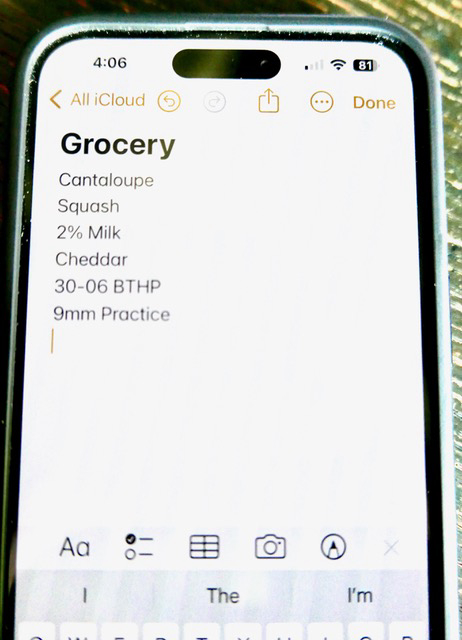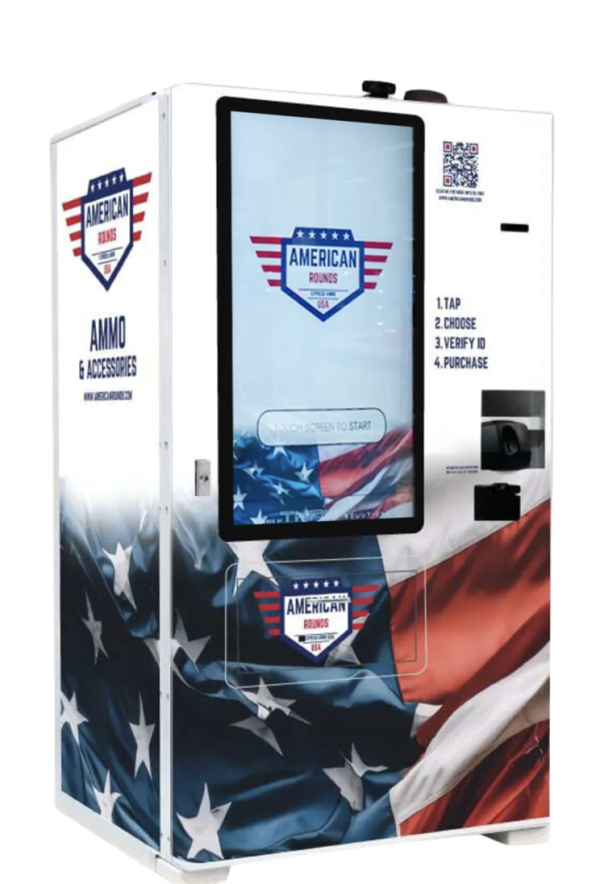
One popular misconception pushed by anti-gun groups is that it’s easy to buy a gun in the United States. They make it sound as if it’s nearly as simple as drive-through fast food.
Patently untrue, but a vivid mental image. When you’re pushing emotion, not facts, that’s good enough.
A Texas company is taking a twist on their untruth that will undoubtedly have anti-gunner groups fuming for three reasons: 1) this is a real idea, and, 2) it’s almost that easy, and 3) it actually lowers the chance of unlawful purchases.
In Alabama, Oklahoma, Texas and Colorado, customers at a growing number of grocery stores really can buy ammunition from newly-installed Automated Retail Machines (ARM).
Not a joke. Not a typo. And not a bad idea, actually.
American Rounds is a Texas company that’s integrating AI and facial recognition technology with proven vending/ATM technology to enable the responsible sale of ammunition via their ARMs. Although they might quibble at a simple vending machine characterization because of their security and purchase verification protocols, a vending machine is the simplest way to visualize their system.

According to CEO Jason Magers, the Texas-based company views their ARMs as a more responsible way to sell ammunition than the traditional over-the-counter method. “It takes ammunition off the shelves,” he told me, “that eliminates theft. And the technology makes it virtually impossible for someone to use a false or stolen ID to buy ammunition.”
When he talks about technology, he’s talking about the machine’s capability to verify the authenticity of an ID, then use facial recognition technology to make certain the purchaser is the person on the ID inserted into the machine. It also enables the machine to verify the age of the purchaser.
Despite some media reports to the contrary, Magers tells me, the machine has advanced technologies like AI and facial recognition, but it lacks another ability that concerns many 2A proponents: the ability to store the information.
“Nope,” he told me without equivocation, “our machines don’t have the ability to store a purchaser’s information. They only verity that the buyer is the person on the ID and is old enough to make the purchase. We don’t store, transmit or keep any of that information.”
The ARMs are capable of real-time inventory tracking. It enables them to notify American Rounds when they’re running low on particular items. It also enables American Rounds to see what’s selling where- and adjust supplies accordingly.
With so many calibers, bullet weights and other variations, I wondered how many “flavors” the machines were capable of carrying -and how they’d decide which ones to offer.
“Depending on the mix of ammunition types,” Magers explained, “the machines can have 30-35 SKUS. The mix of ammunition types will depend on seasons and local information. When it’s turkey season, the variety of ammunition in the ARM may be reduced because shot shells take up more room than rifle or handgun ammunition.”
Pricing, Magers tells me, is set within 5 percent (plus or minus) of retailers.
The purchase experience is essentially a virtual shopping cart. A customer tells the machine the kind of ammunition (rifle/pistol/shotgun), sees the options available, then makes their selections.
When they’re ready to check-out, they insert their identification and it’s verified while the camera on the ARM scans their face to verify their identify. When that’s done, the customer pays for their transaction and the ammunition is placed in a pickup area inside the machine.
So why grocery stores? Because, Magers tells me, the idea originated with grocers. In conversations with a group of grocers, they brought up the idea of having additional products to offer customers. Ammunition was one of the products.
Next time you’re in the grocery, look along the front walls. You’ll be surprised at just how many vending-type machines they already have in place.
Adding an ARM would only require a 4x4-foot footprint and adds an item that is virtually impossible to purchase anywhere else outside traditional business hours.
As virtually any traveling shooter/hunter will tell you, you seldom realize you need ammo in banker’s hours. Being able to pop into a Fresh Value or Super C Mart (two of the chains currently offering American Rounds machines) while buying ice and other miscellaneous supplies could certainly make travel less stressful.
Word is, apparently, getting around.
Magers tells me he’s currently running about 10 calls or emails per hour asking for options ranging from buying a machine to franchising. He also says inquires from hardware stores further validates the appeal of the ability to sell ammunition with a reduced risk of shrinkage (the retail synonym for theft) and no need for a clerk to be involved.
Other options under consideration include expanding the offerings on the menu- including purchasing items via the ARM and having them drop-shipped to the purchaser, placing advertising on the machine itself, and co-branding the ARMs.
Seems the business model is a classic one: find a need and fill it.
We’ll keep you posted.
— Jim Shepherd